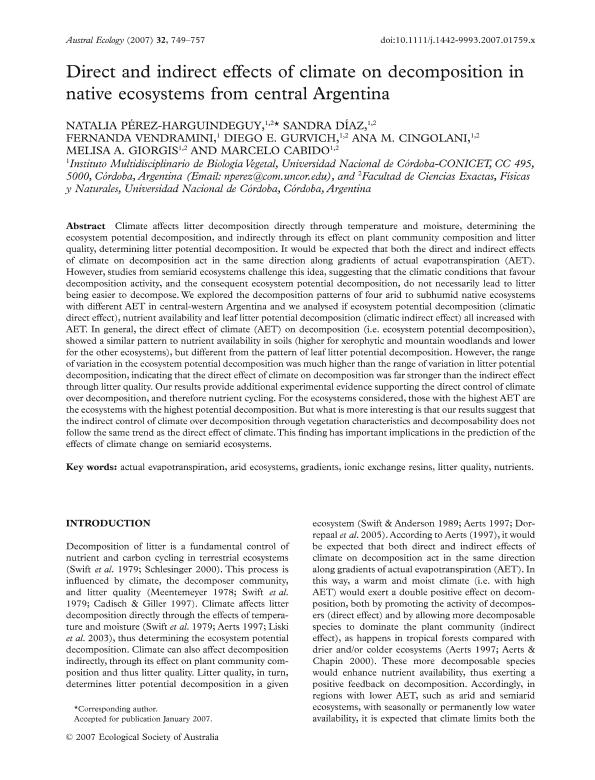Artículo
Direct and indirect effects of climate on decomposition in native ecosystems from central Argentina
Pérez Harguindeguy, Natalia ; Díaz, Sandra Myrna
; Díaz, Sandra Myrna ; Vendramini, Fernanda; Gurvich, Diego Ezequiel
; Vendramini, Fernanda; Gurvich, Diego Ezequiel ; Cingolani, Ana María
; Cingolani, Ana María ; Giorgis, Melisa Adriana
; Giorgis, Melisa Adriana ; Cabido, Marcelo Ruben
; Cabido, Marcelo Ruben
 ; Díaz, Sandra Myrna
; Díaz, Sandra Myrna ; Vendramini, Fernanda; Gurvich, Diego Ezequiel
; Vendramini, Fernanda; Gurvich, Diego Ezequiel ; Cingolani, Ana María
; Cingolani, Ana María ; Giorgis, Melisa Adriana
; Giorgis, Melisa Adriana ; Cabido, Marcelo Ruben
; Cabido, Marcelo Ruben
Fecha de publicación:
11/2007
Editorial:
Wiley Blackwell Publishing, Inc
Revista:
Austral Ecology
ISSN:
1442-9985
e-ISSN:
1442-9993
Idioma:
Inglés
Tipo de recurso:
Artículo publicado
Clasificación temática:
Resumen
Climate affects litter decomposition directly through temperature and moisture, determining the ecosystem potential decomposition, and indirectly through its effect on plant community composition and litter quality, determining litter potential decomposition. It would be expected that both the direct and indirect effects of climate on decomposition act in the same direction along gradients of actual evapotranspiration (AET). However, studies from semiarid ecosystems challenge this idea, suggesting that the climatic conditions that favour decomposition activity, and the consequent ecosystem potential decomposition, do not necessarily lead to litter being easier to decompose. We explored the decomposition patterns of four arid to subhumid native ecosystems with different AET in central-western Argentina and we analysed if ecosystem potential decomposition (climatic direct effect), nutrient availability and leaf litter potential decomposition (climatic indirect effect) all increased with AET. In general, the direct effect of climate (AET) on decomposition (i.e. ecosystem potential decomposition), showed a similar pattern to nutrient availability in soils (higher for xerophytic and mountain woodlands and lower for the other ecosystems), but different from the pattern of leaf litter potential decomposition. However, the range of variation in the ecosystem potential decomposition was much higher than the range of variation in litter potential decomposition, indicating that the direct effect of climate on decomposition was far stronger than the indirect effect through litter quality. Our results provide additional experimental evidence supporting the direct control of climate over decomposition, and therefore nutrient cycling. For the ecosystems considered, those with the highest AET are the ecosystems with the highest potential decomposition. But what is more interesting is that our results suggest that the indirect control of climate over decomposition through vegetation characteristics and decomposability does not follow the same trend as the direct effect of climate. This finding has important implications in the prediction of the effects of climate change on semiarid ecosystems.
Archivos asociados
Licencia
Identificadores
Colecciones
Articulos(IMBIV)
Articulos de INST.MULTIDISCIPL.DE BIOLOGIA VEGETAL (P)
Articulos de INST.MULTIDISCIPL.DE BIOLOGIA VEGETAL (P)
Citación
Pérez Harguindeguy, Natalia; Díaz, Sandra Myrna; Vendramini, Fernanda; Gurvich, Diego Ezequiel; Cingolani, Ana María; et al.; Direct and indirect effects of climate on decomposition in native ecosystems from central Argentina; Wiley Blackwell Publishing, Inc; Austral Ecology; 32; 7; 11-2007; 749-757
Compartir
Altmétricas



